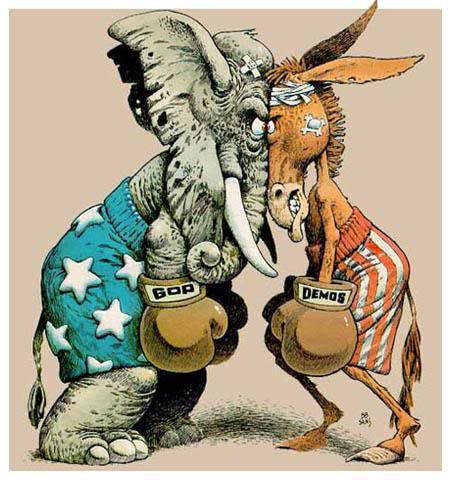Lately, the debate over who is more racist, the Democratic Party or the Republican Party, has heated up, with accusations flying from both sides. The discussion really got going when Chris Hayes, host of MSNBC’s Up with Chris Hayes, said of Republicans, “It is undeniably the case that racist Americans are almost entirely in one political coalition and not the other.”
That got the twitter-verse screaming foul. Hayes himself quickly took back his statement citing economist Alex Tabarrok’s research revealing that where racism is concerned, the parties are pretty much in a tie. Hayes also cited John Sides‘ research that indicates a slightly stronger lean toward racism among Republican’s. But while the lean seems real, it’s not significant.
I side with Tabarrok and Sides. Racism is a problem for both parties. But, I think the issue is more complicated than what’s indicated by their research.
While I agree that the base of each party is equally racist, at least as measured by the narrow metrics of the research, the difference between the Democrats and the Republicans has to do with how each party’s leadership deals with the racism in their ranks. The Republican’s strategy is to organize, amp up, and exploit racist sentiment for political gain. Where racism is concerned, the GOP is about as manipulative as you can get, and given the history of this country and the affect of that history on our culture, that’s saying something.
One can’t put too fine a point on this difference. The Republicans are inciting a racist movement for political gain. Because of that they are, I believe, more dangerous. However, while they are actively breaking new ground and expanding opportunities for racists and racism, they’re no more cynical nor effective at institutionalizing, or at least accommodating, racism than the other side.
The Democrats present themselves as agents of equity while acting in ways that define what is necessary to achieve equity as nothing more than a bunch of empty platitudes. And that’s not the worst of it. Obama has one upped the Republicans when it comes to xenophobia, not through his words but through his actions, ordering a record number of immigrant detentions and deportations.
The Obama administration has also done next to nothing to end the crisis of mass incarceration of black and brown people in the U.S. They have also failed to directly address the disproportionate impact of the recession and the mortgage crisis on communities of color.
When it comes to race, the Republicans have started a racist movement that is pulling them ever further to the right. But the Democrats have passively played along by following them to the right to capture the political space the Republicans’ rightward march is leaving open. In other words, for the sake of political gain, the Democratic Party has, over the last 32 years or more, grown increasingly conservative on race, not to mention many other issues.
The Obama administration’s policy on deportations is one expression of that growing conservatism. His near silence on the issue of race is another.
I get the fact that being a Black president in a racist society makes talking about race poisonous to Obama’s political prospects. He didn’t create that problem. But, if you buy that, then it’s up to us to be the antidote to that poison by stepping up the pressure and making it more politically expedient for him to speak out than to shut up.
Even in this campaign, with coded and not so coded racist messaging a core strategy of the GOP, the Democrats are leaving discussions of racism to their surrogates. And boy are those surrogates buzzing about Republican racism.
But are they doing so in order to end racism? Nope. They’re doing so in order to make political points.
Now that’s cynicism, and it needs to be called out, not just because it’s bad politics, but because it leads to bad policy.
